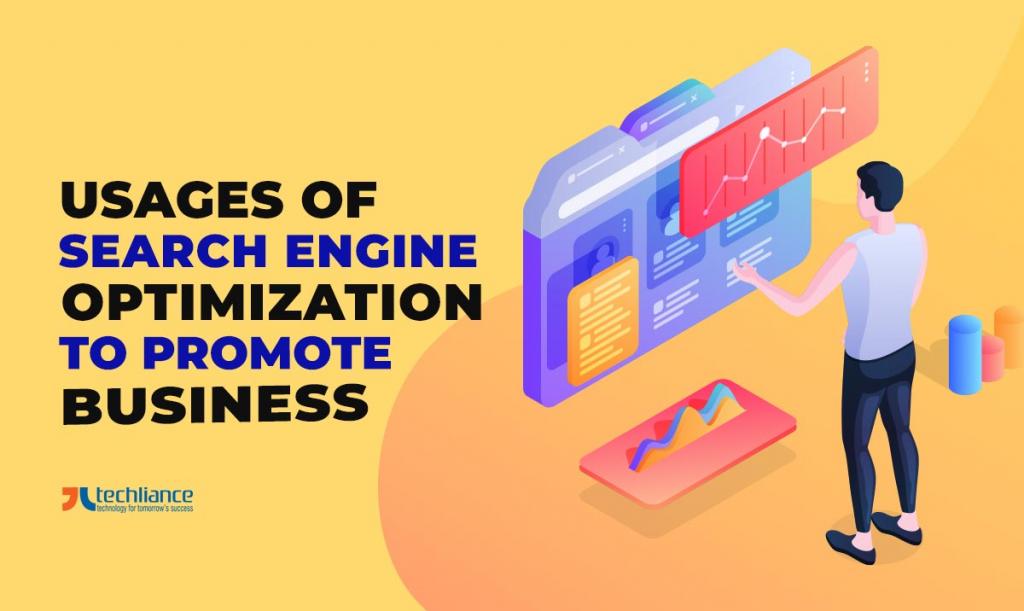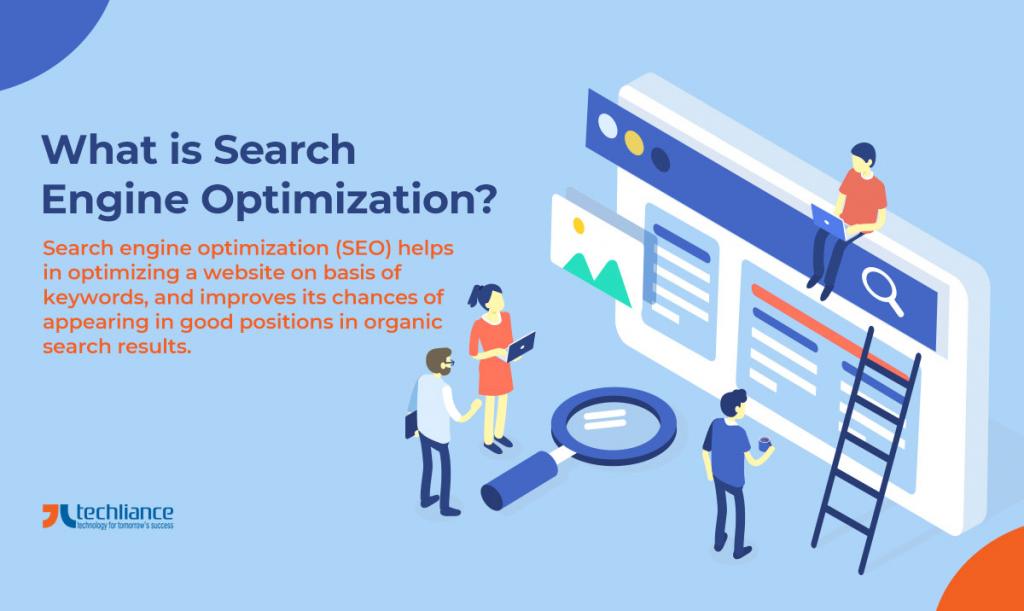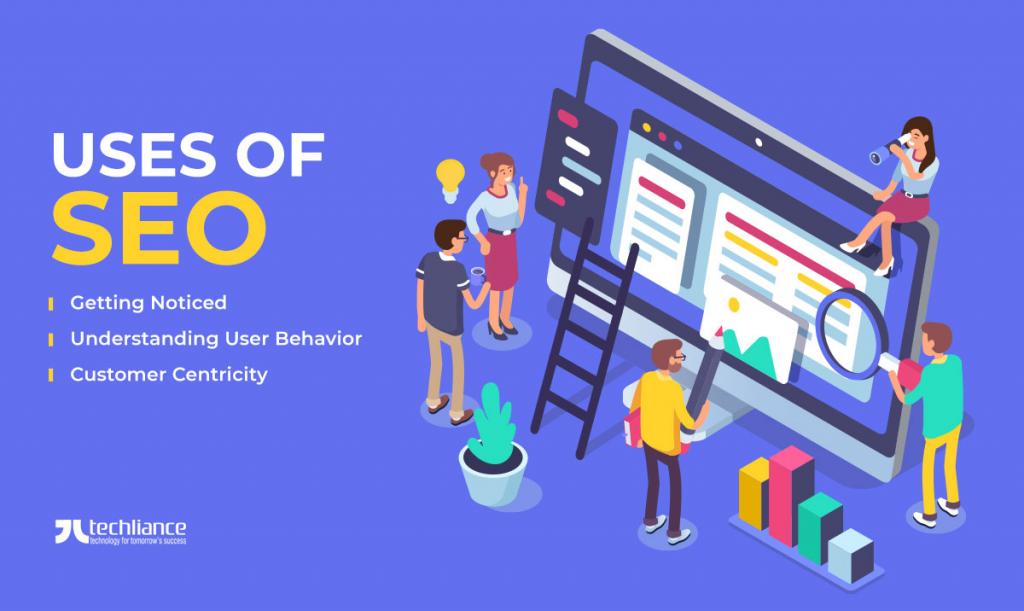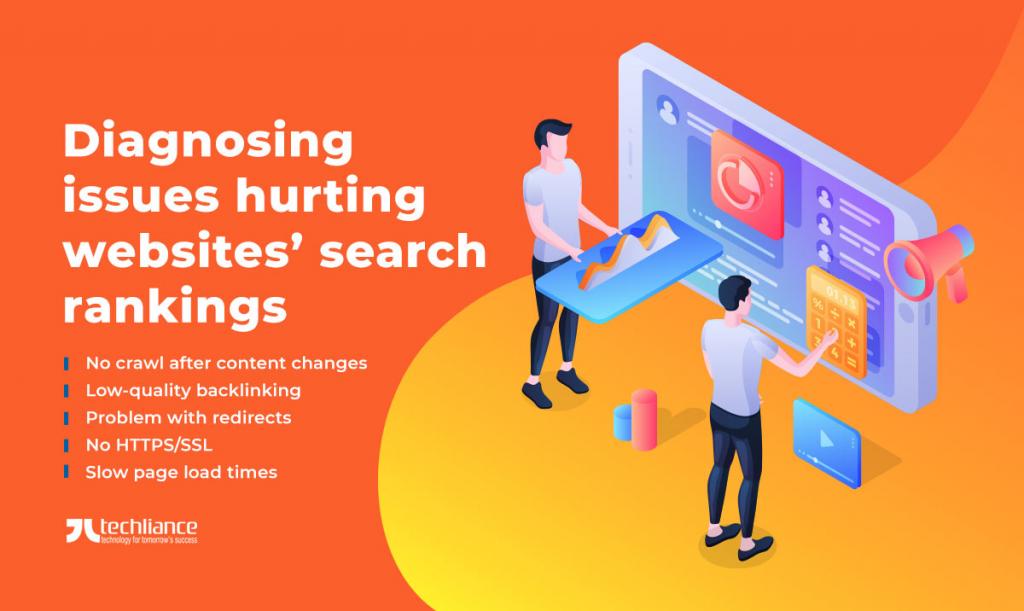At present, creating a website for an online business is just not enough. Yes, you are right – you need to incorporate search engine optimization (SEO). Yeah, but what the heck does SEO mean? How can it benefit a company website in 2024 and future?
Search engine optimization has been doing its usual round of circuits for a while now. SEO is similar to that cool thing, that businesses want to employ, but not many know how to perform this. It’s like watching a magic show where the magician pulls up cool tricks from his sleeve.
Knowing the trick is one thing and properly implementing it is another aspect. So, an experienced information technology services firm can help in building a search-friendly website or redesigning it. Applying the right SEO strategies enables your business to get better search rankings.

What is search engine optimization (SEO) essentially?
Search engine optimization (SEO) helps in optimizing a website on basis of keywords. SEO improves its chances of appearing in good positions in organic search results. It is important because organic traffic is among the most important factors for many businesses globally and in the US.
Every time users search for things online; they type in specific words in search engines to get results. And keywords are exactly that. They are the random searched words for a particular business, product, item, or anything under the sun.
But it’s not right to stuff the keywords inside your content for ranking better. So, add keywords efficiently and smartly within the content. Therefore, the content looks clean and passes the litmus test at hands of smart ML embedded algorithms of search engines.

Important SEO Stats to know for site owners and marketers
- In April 2020, Google had 86.02% of the global market share of desktop search traffic, followed by Bing at 6.25%, Yahoo at 3.36%, Baidu at 0.83%, and Yandex at 0.8%. (Statista)
- Google handles around 2 trillion searches per year at least. (Search Engine Land)
- The search algorithm of Google has above 200 factors to rank websites. (Google)
- The topmost important signals used by Google to rank websites are content, links, RankBrain, metadata, performance, etc. (Search Engine Watch)
- 0.78% of Google search users click the results on the 2nd page. (Backlinko)
Utilizing SEO for business growth during 2024 and beyond
Let’s talk about the invisible wall that every business hits occasionally. Especially, in today’s world, the COVID-19 pandemic and its aftermath have caught the industry by surprise. So, businesses want a connection with end-users that can only be made online.
That’s why having a viable business presence is of utmost necessity. Digital marketing and SEO have become the new norms where you want users to find your business. Implementing the latest trends in online marketing helps in enhancing your digital standing through 2024 and in the upcoming decades.
Uses of SEO for business promotion
This works like users are looking for businesses like you over the internet. So, they find you among the top ten search results. And bingo, you have them visiting your website.
Once you get into the top 10 results, then you aim top 5. Subsequently, you target the top 3 rankings. Ultimately, your goal is to get the first position in SERPs.
Given below are the benefits of SEO, and they apply to business promotion as well.
- Getting noticed
- Understanding user behavior
- Customer centricity

Let’s explore these features of SEO that put the spotlight on businesses in detail now.
Getting noticed
Search engine optimization plays a crucial role in enabling users to notice your business. You try building your traction by continuously finding ways to attract users.
Firstly, you find out the keywords that your target audience usually searches. Secondly, you find ways to incorporate those keywords strategically in your content, answering user intent. Sometimes, companies even employ content writers for creating specially customized blogs for gaining traction online.
As you build up, the search engines also become kinder and start ranking your website higher in search results. You want to be the top website whenever your user-base search for a business like yours. That itself is a feat that very few businesses achieve.
Imagine the huge volume of websites that exist, and the enormous competition you face, all want to get recognition. Search optimization can truly aid in getting the attention you need. It’s like a much-desirable booster that energizes you to get a better ranking in search engines.
Understanding user behavior
A lot of times, it’s important to learn the user behavior to better serve them accordingly. Online businesses have to know how the users are reacting to their websites. These are some of the relevant questions that SEO can help you answer.
- What’s the bounce rate?
- Which pages do users mostly visit?
- At what stage do users abandon their orders?
- Is the payment process too cumbersome for them to handle?
- What are the most common exit pages?
A whole chapter on understanding terms relating to analytics is exclusive to this aspect. That is as important to your business as the look and feel of a shop outlet. Comprehending user behavior and providing the right user experience is key to better interaction.
Now, replace that physical attribute with how the website looks. Is the website easy to navigate? Does the website help users in finding what they are looking for?
Search engine optimization helps you get better at creating, managing, and running a website. This not just invites visitors but also hooks them as customers. It is your end-game. Because there is no point in gaining traction without having user retention that generates revenue for your business.
Customer centricity
Mold your business as per what the customers want. Learn from the competition, and see what they are doing to make their websites get seen. Stand apart and stay ahead of your competitors to get the advantage.
Online presence and local standing of a brand, just don’t mean only having a proxy availability when you are there. In essence, you are just killing time by not bothering about what your users want. Pay attention to their requirements to better serve them.
Develop a website solution that truly connects on all levels. SEO can only get you as far as getting people entering your shop. Afterward what happens, is another ball game that you need to be prepared for.
Diagnosing issues hurting websites’ search rankings
Even for those within the digital industry, how search engines rank sites can still feel somewhat mysterious. Whilst well-known brands can have the advantage due to multiple reasons, but then sometimes, they struggle to keep up. Rankings can fluctuate, and smaller websites can climb to the top of page 1 for high-volume keywords.
The sheer number of ranking factors can make it challenging to understand what you’re doing right or wrong. Of course, that’s not to say that search engine algorithms are completely impenetrable. Over the decades, tech agencies are offering link building, social media marketing, and specialized WordPress SEO services.
Many of them manage to provide immense value to their clients’ online presence. Just in case, search engine rankings were an exact one-to-one science. Then, we would have a very different digital landscape from the one we’re familiar with.
If you’re someone who has done everything they can to try and improve their search rankings through traditional means. Only to see middling results when it comes to your keyword positions, don’t fret. Today, we look at a few possible causes of poor rankings and what you can do to fix them.
- No crawl after content changes
- Low-quality backlinking
- Problem with redirects
- No HTTPS/SSL
- Slow page load times

Next, we briefly discuss these problems affecting search rankings and their resolutions.
No crawl after content changes
One of the best things that you can do as a website owner is to regularly update your site’s content. Remember that search engines thrive off content. Accordingly, new content for their algorithms to crawl shows that you’re an active site to which they can direct visitors.
However, this process can take time. In case, you’re constantly updating the same pages without giving the rankings time to adjust. Then, you’re unlikely to see the fruits of your labor.
The process of crawling a site naturally can take as little as four days or as long as six months. In the event, you’re making continuous changes and expecting your rankings to shoot up immediately. Then, you’re going to bear a lot of disappointment and confusion.
Solution
Submit your new content to Google Search Console (formerly known as Google Webmaster Tools) to speed up the crawling. So, this allows you to directly alert Google to the existence of new content. Rather than waiting for Google to find it on its own.
Google Search Console is an incredibly valuable tool for business owners and search professionals. It gives you several insights into index coverage, backlink, search performance, page experience, clicks, etc. Also, website owners can sync it with Google Analytics to get a better picture.
If you’re simply updating your pages for the sake of staying active in the eyes of search engines. One of the best things you can do is create on-site blogs. This is a fantastic way to provide additional rankable pages for search engines to index.
Moreover, this gives you a chance to provide relevant information and insights to your audience. They drastically increase the amount of traffic on your site when done correctly. Also, on-site blogs are effective conversion tools.
Low-quality backlinking
People in SEO and content marketing likely see the phrase “link building is dead” pop up from time to time. The old SEO cliche is often a response to Google changing its algorithms around the start of the 2010s. This made it harder to create spammy links without fear of repercussion when it comes to their rankings.
In truth, link building is still a potent tool in the SEO industry. Thus, it is the backbone of many digital marketing strategies. However, it is a tough call for those people that were inexperienced when they first started their link-building journey.
Because a large number of low-quality links may still be present weighing down your potential rankings. These backlinks put your site’s credibility in question when it comes time for search engines to crawl. So, always do ethical link building conforming with white-hat SEO practices.
Solution
Well, to start, you should look to disavow any backlinks that appear spammy or untrustworthy. This is a good idea even if you haven’t partaken in link building yet. But have still managed to amass a large number of bad backlinks naturally.
You can find more information on how to do it at the helpful resource by SEMrush. This action will effectively tell search engines that you don’t claim ownership of these links. Therefore, you prefer that search engines don’t consider these unnatural links when determining your site’s credibility.
From there, you can start to build up your backlink profile. Go for creating high-quality links from reputable sites within your industry or niche. By doing so, you’re showing that reputable people are using your site as a resource in your field.
Relevancy doesn’t always have to be hyper-specific. Just think about whether a website would naturally link to a site like yours in their articles or posts. If the answer is yes, then relevancy-wise, it is a good opportunity.
Problem with redirects
Occasionally, websites go through significant changes, such as a complete restructuring. Then, it’s natural for your backlinks to be affected. This is not the end of the world of course.
Website owners can often use redirects to get the links back to where they’re meant to be. However, web admins sometimes automatically redirect links back to the homepage. You may not feel the difference, but it can cause issues.
Consider this, your link was to a blog on a particular subject, and now it is to your homepage. But it has little to no specific information on that subject. So, it can cause you to lose a lot of hard work in terms of your rankings.
The same can be said for on-page internal linking, which can be damaged. Nevertheless, it causes a poor user experience when redirects aren’t put in place correctly. Search engines need sites to be easy to navigate when crawling. If all your links keep leading to the same relatively irrelevant page, then your rankings are inevitably going to suffer.
No HTTPS/SSL
The importance of HTTPS and SSL/TLS has some debate behind it. As people can’t seem to settle on an answer as to how relevant HTTPS/SSL is when it comes to rankings. However, statements by Google from 2014 suggest sites that are https:// rank higher than sites with the standard http:// protocol.
Also, there is considerable anecdotal evidence to support this from digital specialists over time. HTTPS is the main signal for Google’s page experience update with core web vitals for mobile and desktop. Mobile usability is the third signal for mobile though.
Google may punish your website in the rankings simply for appearing outdated due to its lack of an SSL certificate. Luckily, there are several free and affordable options for getting your TLS/SSL certificate. So, it shouldn’t be too difficult to make the change to mark your website as secure.
Slow page load times
Since the early 2010s, Google is clear that page load speeds have a direct impact on ranking potential. This was coupled with an announcement in 2018 that page speeds would also affect Google Search and Ads landing pages. So, your website must not take over 3 seconds to load on mobile. Otherwise, a user is less likely to be served your site in the SERPs.
One thing to keep in mind is that page speed alone won’t shuttle you to the top of the rankings. Nonetheless, a site that has slow loading times is unlikely to ever rank as high as it should. Even, when most other page optimizations are in place.
Many page loading issues are simply caused by elements and imagery that are too large. Finding ways to compress these elements should provide your pages with a far better speed score. Big names in the search community like Moz has written extensively on the subject of page speed improvements.
Realize that digital optimization and SEO aren’t exact sciences. So, it can take quite a bit of trial and error to find the true reasons behind poor rankings. Though, it’s always going to be a process that is worth the effort that goes into it.
After all, if you’re looking to make it online, your rankings could be the deciding factor in your business’ success. So, do your research, and try the tips we are providing in this writing. Hence, you’ll be well on your way to better rankings and a better experience for your customers.

Conclusion
Some tactics are not just there as maybe’s but they tend to evolve as strategies that must be employed. Search engine optimization is one of those things that you can’t simply do without. In today’s world, where you are looking for instant connection with your audience, you want an indelible association.
Making this possible digitally has its challenges, but the right content can help you achieve it. Gradually, build up your digital presence as strongly as possible. This will help you in getting noticeable online, giving you a competitive edge from 2024 onwards.
Do you need SEO friendly website that can perform well in organic search? Then get experts to develop or redesign a website with SEO guidelines for better performance. Contact Techliance today for your custom web development and SEO plan.
Search Engine Optimization FAQs
SEO is an abbreviation for search engine optimization, that focuses on your website’s better presence in search results. As a digital marketing strategy, it works for increasing the quantity and quality of organic traffic from search engines. SEO experts target popular search engines like Google, Bing, Yahoo, Baidu, Yandex, etc.
Companies and brands use SEO to get more visibility and to make websites rank higher in the organic search results. Search engine optimization targets keywords or the search phrases that attract a user to your business. For example, you have a business that sells mobile phones.
Then your target keywords will be ”mobile phones”, ”cell phones”, ”smartphones”, and ”buy mobile phone” etc. You will want your website or product pages to appear for such keywords in SERPs of search engines. Remember that examples of popular search engines are Google, Bing, Yahoo, etc.
You can use different ethical tactics of SEO to increase your visibility (or how high you rank) in You use different ethical tactics of SEO to increase your visibility (or how high you rank) in organic search results. Search engine optimization involves identifying which keywords and phrases your target audience use, when finding products or services like yours. Then you work towards ranking well for those search queries. As a result, you improve the chances of getting qualified traffic, which is likely to convert into customers.




